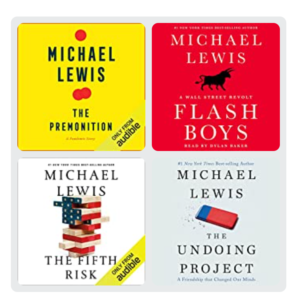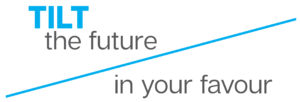
30 Sep How to turn boring into riveting like Michael Lewis
“Michael Lewis is a master at making seemingly boring topics — baseball statistics,
government bureaucrats, collateralized debt obligations — riveting. So how does he do it?”
Ezra Klein
It turns out that Michael Lewis’ unique writing style has flummoxed such content creators as Ezra Klein and Malcolm Gladwell. Which was handy, as I was able to dig into their intriguing conversations with him when I went sleuthing for an answer to this very question. I often pick an audio book by Michael Lewis as company on the long 530-mile drives between Toronto and Boston. I am never disappointed. The hours melt away as he holds my attention the entire journey. How does he do it?
Some of what I discovered about Michael Lewis’ process surprised me:
- He doesn’t start with a topic. He starts with a person.
- He doesn’t research like an academic. He interviews and explores the layers of a topic.
- He doesn’t sugar coat the risks he exposes. But he sprinkles great stories while sharing the core topic that leaves us asking important questions.
——————————————————————————
He starts with a conversation
“I find a character to tell the story through”
That is where the magic starts. Michael Lewis doesn’t start with the topic. He starts with the person. In fact he calls them his characters. These are often ordinary people with ordinary lives, but whose eyes light up as they share what they know.
He gets to know them, sometimes over years. What was the serendipity that placed opportunity in their path? How did characters like Public Health Officer Dr. Charity Dean (The Premonition) hesitate long enough in their busy daily lives to ask “What if” and “Why”? How did those questions possibly impact real lives?
When you read Michael Lewis’ books you are not learning the technical call refs use in a basketball game, collateralized debt obligations or the risks inherent in the machinery of the US Government. Instead you are discovering why Max Steir would choose to spend a lifetime in civil service rather than in the lucrative private sector (The Fifth Risk). Through their motivation and passion, you are “pulled through the story”. You leave wiser, totally unaware that you just sat through a dissertation on something quite complex and complicated.
Tweet link – The Brad Katsuyama story in Flash Boys – how a Canadian trader’s curiosity uncovers the world of High Frequency Trading
He lusciously unravels a topic
“I engage in a subject that I want to know more about. Then I figure out how (I want) to convey the subject – so I’m willing to put effort into (doing that).”
Michael Lewis’ interest in a topic unfolds gradually. Instead of researching it academically, he explores his way through with intellectual humility and without judgement, bringing us along with him. “But why?! What is the backstory? What are the domino pieces that lined up for this to be so?” you sense him asking – the very questions you know you also want answered!
He is tenacious in the discovery process. He interviews his character, and their family, their friends, their colleagues. As he progressively peels back through the layers of the core topic, he is constantly searching for sight lines – points of reference and metaphors that we, his “common-man” reader, can use to stay engaged in the story. For example, we all check our weather apps daily. This gives us the appropriate context in The Fifth Risk when discussing the political appointment of Barry Myers, CEO of Accuweather as head of NOAA – who works to block free and easy access to the data sent down by the weather satellites.
But there is something more. We find ourselves gradually absorbing complex math or risk management alongside our guiding character, growing in knowledge in tandem with their natural curiosity. When Dr. Carter Mesher describes himself as possibly having ADD (attention deficit disorder) in The Premonition it is obvious why his attraction to the chaos of critical care allows him to cut through the symptoms and get straight to the solution with laser acuity. From there, through his stint in the VA, it is not a big leap to see him join the Pandemic Plan taskforce in the White House where his unique style of inquiry and tenacious tinkering allow him to make great impacts in pandemic planning. We learn just enough to know, just enough to continue to stay curious. We were never made to feel less intellectually capable.
Tweet link – While we are busily involved in the “intellectual love story” between Amos Taversky and Daniel Kahneman
in The Undoing Project we come away with the way the complexity of math and science collided to change the science of decision making.
He makes us question the risk of inertia
“A lot of what I’m writing about is people fiddling with established ways of doing things.”
Michael is drawn to large labyrinthine systems that require people to engage, to work cohesively together towards a common goal. Because of this he is not afraid to delve into the gaps. He progressively peels back the layers of time and we are exposed to the long game of the topic through the tableau of characters. We see how many, many years of happenstance, insecurities and process controls settle into habits in people, and processes in bureaucracy. But once established they rarely get challenged or reevaluated.
He searches out the conundrums. He does this through the kind of stories that the reader remembers and repeats as they wrestle with the unwieldy topic of risk. He looks at the human traits that place humanity at risk. We see the same patterns – greed, anxiety, insecurity, loneliness. But mostly apathy. He finds the people who are willing to stand up to this inertia, and fight to make change. They see that the world has moved forward, and they make ripples as they choose to challenge those mired in the status quo.
In Moneyball, Oakland A’s General Manager Billy Beane says we need to “think differently”. Beane challenges the way baseball teams are structured. He leans into the vision of a young Yale-educated economist who has a passion for baseball statistics who has been following sabermetrics (say what?) the studies of Bill James, a security guard at a pork and beans factory that focuses on a theory of on-base percentage because ball clubs ultimately win by runs rather than super-personalities. “You need wins. So you buy runs”.
Regardless of how this redefines the game of baseball, my memory of the whole story was wrapped in one scene. In the moment that ex-catcher Scott Hatteberg hugs his wife, you understand what this new vision means for an injured thirty-year-old athlete with three young daughters at Christmas. It allows him to be welcomed back into his sport and given another chance, playing first baseman. Because the numbers had seen what everyone else had missed – Scott scores runs. I had to google sabermetrics, but I’ll never forget that scene. It is moments like this where we see the effects of inertia on our society. And it is stories such as these that stick with you long after the last credit has run.
Tweet link: Michael Lewis makes statistics human and baseball intriguing – Moneyball: Signing Scott Hatteberg
https://www.youtube.com/watch?v=vyvu1nWjOlI
How can we use these techniques in our writing?
My work covers topics at the intersection of Future of Work, Parenting and Climate Action. Less topics and more systems – with a long time horizon. And depending on where you place the comma in the sentence above, ideas that can be unwieldy and/or polarizing.
How do I bring my reader through the story of the topic and engage them in the questions that keep me awake at night? How do I broaden the lens through which they view a topic and give them enough information so they can make their own informed decisions?
I particularly like that last idea. Through my work in futurism, my best hope for the world is a belief that the best idea can come from anyone, anywhere, at any time. If we can create the space for it.
Your topics may range from NFTs to the Peloponnesian War. How will you bring your audience along on your journey?
If I want to engage my audience:
- I need to introduce my reader to someone whose passion for the topic allows all of us to gradually learn together
- My reader should always have context, a reason for why this matters in their life
- At the end, there has to be a sense of purpose and a call to action that keeps the reader continually engage
Oh. And it doesn’t hurt to sprinkle some memorable stories throughout my work!
He believes in humanity
What also comes through at the end of a Michael Lewis book is his unshakeable belief in the power of the good part of our humanity. He is an optimist. You close the back cover believing with him that there are enough good people on earth with good intentions. He believes in the refillable glass of hope. I think that is ultimately what I want to bottle and use as I write in a way that rhymes with his work. Because I truly believe that too.
Inspired? What one thing will you do as you channel your inner Michael Lewis the next time you want to make sure your voice is heard? Please email me a copy of your work if ever you use these ideas because I truly believe they work!
CREDIT & THANKS; DEFINITIONS & RESOURCES:
- Having Michael Lewis ride shotgun via his audiobook Premonition on the 530-mile 9-hour solo drive from Boston to Toronto
- Collation prompt from WoP7
- The Ezra Klein Show (podcast – Episode Michael Lewis reads my mind, and 92nd Street Y: Michael Lewis in conversation with Malcolm Gladwell.
- Thanks for the editing assist: Michael Dean, Alexandra Allen.
- Find a version of this thought for today article on LinkedIn, Instagram, and Medium
- Photo, audio & video credits:
- Karena de Souza using Canva




No Comments